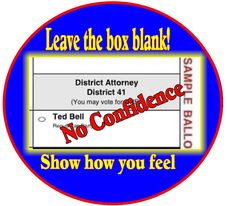“As for Pool’s role in the matter, Bell said his actions did not rise to the level of a crime; therefore, he would not face criminal charges.” Daily Courier article, November 18th, 2019 by Ritchie Starnes.
The censure of Mr. Randy Pool was released on Friday June 11, 2021 by the North Carolina Supreme Court. In it the North Carolina Supreme Court has laid out in simple terms the crimes that were committed by former Judge Randy Pool. Evidently Mr. Ted Bell either did not see that these were crimes or chose to ignore them outright. Mr. Bell’s common refrain “Do the right thing, at the right time, for the right reason“ is used at campaign events and in speeches; however his failure to charge back in 2019 or any day since shows that these words are empty. We will see if Ted Bell is more interested in protecting the people in our two counties that he serves, or those who hold power and served with him in the past. Will Ted Bell charge Mr. Randy Pool with real crimes that have weight, or will our current district attorney seek to charge petty crimes which only serve as a slap on the wrist, to further protect Randy Pool from the full weight of the consequences of his past bad acts, or will he continue to choose not to charge at all?
I have included the conclusions of law from the North Carolina Supreme Court in this post so that readers can judge for themselves. This document is a censure and has no binding power over the District Attorney so Ted Bell may choose to ignore it if he wishes, however these are the State’s highest judges presiding over the highest court laying out a clear path towards the prosecution of a person who has hunted and victimized the most vulnerable among us.
KRINN EVANS
____________________________
IN RE POOL
2021-NCSC-61
Order of the Court
The Commission made the following conclusions of law:
- Commission Counsel, Respondent and Counsel forRespondent, all of whom executed the Stipulation, agreed that the factual stipulations contained therein were sufficient to prove by clear and convincing evidence that Respondent had violated Canons 1, 2A, 2B, 3A(4) and 3A(5) of the North Carolina Code of Judicial Conduct. . . . Upon its independent review of the stipulated facts and the Code of Judicial Conduct, the Commission agrees.
- Canon 1 of the Code of Judicial Conduct requires that a judge must “participate in establishing,
maintaining, and enforcing, and should personally observe, appropriate standards of conduct to ensure that the integrity and independence of the judiciary shall be preserved.” Canon 2A of the Code of Judicial Conduct requires that a judge “should conduct himself/herself at all times in a manner that promotes public confidence in the integrity and impartiality of the judiciary.” The Commission concludes that Respondent’s failure to personally observe appropriate standards of conduct in and out of the courtroom, his conduct in creating the perception among local law enforcement that he wanted a favor in the matter involving Ms. [T.], and his conduct in making misleading statements to the SBI and the Commission violated Canon 1 and Canon 2A.
- Canon 2B of the Code of Judicial Conduct provides that a judge “should not lend the prestige of the judge’s office to advance the private interest of others.” The Commission concludes that Respondent violated Canon 2B by using his office to assist various female litigants as found in the Findings of Fact, including his conduct in using his position as Chief Judge to direct a local attorney to assist a litigant with whom Respondent was having a sexual relationship and to otherwise use his office to assist her in her divorce proceeding.
- Canon 3A(4) of the Code of Judicial Conduct provides that “except as authorized by law, [a judge may] neither knowingly initiate nor knowingly consider ex parte or other communications concerning a pending proceeding.” The Commission concludes that Respondent violated Canon 3A(4) through his conversations with the women as described herein relating to pending proceedings in his district.
- Canon 3A(5) of the Code of Judicial Conduct provides that a “judge should dispose promptly of the business of the court.” The Commission concludes that the Stipulation of Facts establishes that Respondent violated Canon 3A(5) through his constant cell phone use on the bench, frequent breaks to have conversations or physical encounters with women he contacted through Facebook, and frequent continuances and recusals (some of which were created by his sexual misconduct).
- The Preamble to the Code of Judicial Conduct provides that a “violation of this Code of Judicial Conduct may be deemed conduct prejudicial to the administration of justice that brings the judicial office into disrepute, or willful misconduct in office, or otherwise as grounds for disciplinary proceedings pursuant to Article 30 of Chapter 7A of the General Statutes of North Carolina.” In addition, Respondent has stipulated not only to his violations of the Code of Judicial Conduct, but also to a finding that his conduct amounted to conduct prejudicial to the administration of justice and willful misconduct in office. . . . The Commission in its independent review of the stipulated facts and exhibits and the governing law also concludes that Respondent’s conduct rises to the level of conduct prejudicial to the administration of justice and willful misconduct in office.



